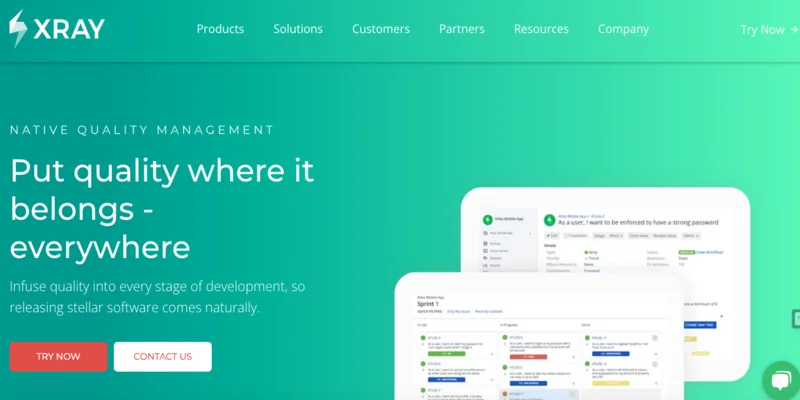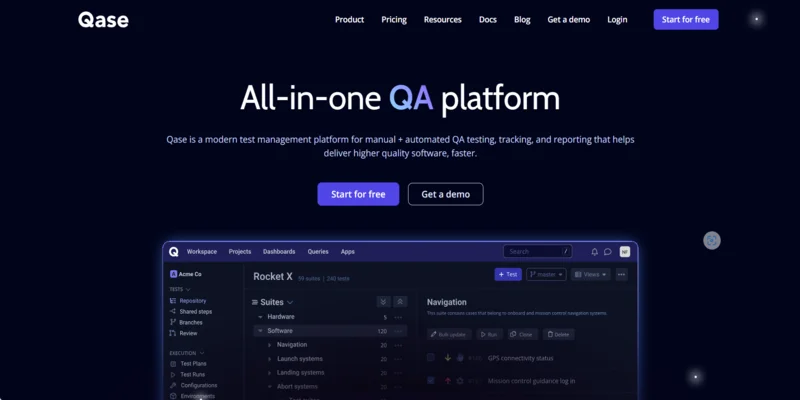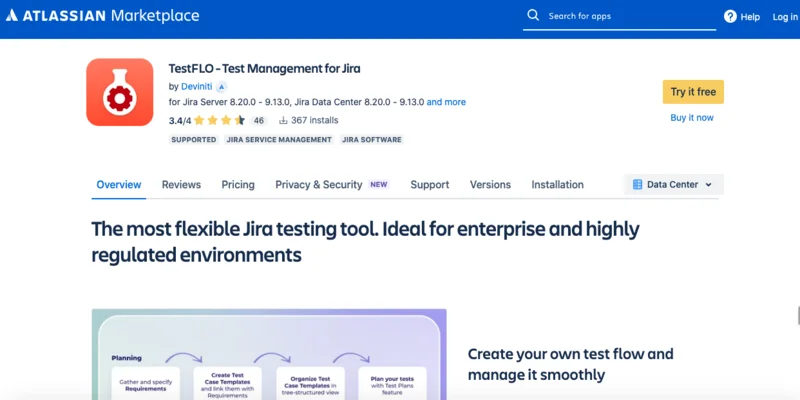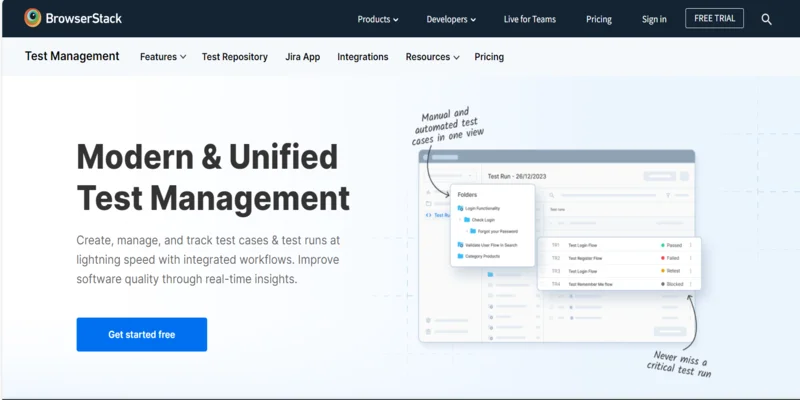Do you know the best practices to implement into your software development life cycle (SDSL) to make it perfect? Test Management is one way to achieve this. With proper test management, you can successfully deploy a comprehensive application security program while strategically allocating your resources to crucial areas of your software.
Before we delve into the test management process, let’s know what are test management tools and also about some of the best free test management tools.
What is Test Management?
Test management is the practice of managing, monitoring, executing, and reporting on tests of applications to ensure software quality and compliance. This process manages everything from the start to the end of all software testing activities to deliver a high-quality software application.
What are Test Management Tools Used for?
Test management facilitates collaboration between the testers and the developers to meet on-time product delivery. The primary objective of test management is to build a bug-free, high-quality software application that meets customer demands.
Additionally, this practice also streamlines project resource allocation for organizations and improves team collaboration.
Test Management Process
By now you know what are test management tools used for, now let us understand how they work in detail. The test management process provides planning, controlling, tracking, and monitoring software testing activities. To conduct the entire process of test management systematically and adequately, you must invest your time in these 2 substantial phases:
1. Planning
This is the first phase that requires a test manager to establish a comprehensive plan of the test cycle, including:
A. Risk Analysis
Risk Analysis is the first step to identify the potential loss from a given action or activity. This step requires test managers to use application security tools like SAST (Static Application Security Testing) to avoid any possible loss in the future and save on project costs.
B. Test Estimation
Test Estimation is a forecast and prediction of the required resources, human skills, project timeline, and overall cost needed to complete the test. This step ensures enhanced planning and precise execution at every test management stage.
C. Test Planning
The test manager puts together a comprehensive document that explains the test scope, strategy, objectives, suspension/exit criteria, test deliverables, resource planning, etc. This 3rd step in the test management process is crucial in the development of heavy software systems.
D. Test Organization
Organizing the perfect testing team is the final step while you are planning for the test management process. This step requires test managers to appoint a skilled testing team and define their roles in the testing process.
2. Execution
It is the 2nd and final stage of the test management process that requires implementation of the test:
A. Testing Monitoring
Once the planning is done, this is the first step of the test management process. It includes software performance testing, evaluating & sharing feedback on the current metrics, and ensuring the budget meets all testing requirements.
During monitoring, the test manager is also responsible for conducting a comparison between the planned and actual performance and recording & reporting any identified issue.
B. Controlling
The need for this step arises when the software does not run as planned. And, most of the time, there will be certain deviations between the planned & actual work. Hence, this step is required to alter and correct the deviations from the test plan.
C. Issue Management
Test managers need to identify, report, and resolve any issues that come up during testing. This stage also ensures the project is completed within the deadline and the original budget while retaining the customer’s trust.
D. Test Report and Evaluation
After the project is completed, it is time to prepare the test report and conduct an in-depth evaluation of the testing process. This report is the final review of the testing process and determines the quality of the software before it is released and made available to the public.
Best Test Management Tools
Let’s dive in to know about some of the top paid and free test management tools:
1. Xray
Xray is a potent Test Management tool for Jira. It streamlines the software testing process with JUnit, Robot, NUnit, and other test automation frameworks. The platform also supports manual testing to help you manage and organize tests.
With Xray, you can automate the entire process of test execution and generate test reports. The tool also promotes Native Quality Management, where all processes, tests, and tools used by QA are built into your development environment, such as Jira.
Features
- Improve productivity with automated testing
- Get advanced reporting to make smart decisions
- Prioritize your time with Risk-Based Testing
- Traceability between requirements, tests, defects, and executions
- Integrates with leading automation frameworks like Jenkins and Selenium
Pricing
The pricing of Xray varies depending upon the number of users you have. For instance, for 10 users, it charges you $10 annually and its subscription goes up to $42,000 annually if you have more than 10,000 users.

2. Qase
With an intuitive interface and straightforward features, Qase is another leading test management tool that facilitates test case management, test planning, powerful API, webhooks, and issue management.
It allows clearer observability and organization of testing with custom dashboards and role-based access control. So, if you want to integrate modern testing into every phase hassle-free, Qase is the answer.
Features
- Comprehensive collaboration capabilities
- Automation for test execution
- Seamless regulatory-compliant version control & history tracking
- Integration with diverse QA and software development tools
- Traceability between needs and test cases
Pricing
This all-in-one QA platform offers a free plan that is ideal for students and small projects. Its Startup plan costs you $20 per user/month, and the Business plan is priced at $30 per user/month. It also offers a Custom plan designed for large enterprises.

3. TestFlo
TestFlo for Jira is primarily about scaling, compliance, and flexibility. It is an ideal tool for large businesses, helping them manage and run testing to ensure the software is tightly integrated into the Jira issue view by using custom flows and workflows.
TestFlo is a customizable test management app that is designed to meet all external standards and your team’s excessive demand. Whether you are creating a high-quality app or need assistance with your test project, this platform has got you covered!
Features
- Test repository tab
- Anonymized usage statistics
- Adding test case group
- Test execution tab
- User feedback enabled
Pricing
The platform charges you $10 annually for up to 10 users and $4000 per year for up to 250 users. There are 3 other subscriptions in between these price plans. Choose any as per your needs.

4. BrowserStack
BrowserStack Test Management is an incredible single unified platform that empowers testers and developers to run application tests on all desktop browsers and 3000+ real mobile devices. The platform leverages valuable insights on testing trends to ship high-quality products swiftly.
Its clean and intuitive UI imports easy-to-understand features. BrowserStack’s one-click data report, hassle-free integrations, and centralized test case repository set it apart from its competitors. The platform also features a native Jira application that helps manage your test cases and reflects all changes in test management.
Features
- Parallel testing
- Default apps access
- Network simulation
- Natural gestures and interactions
- Dark mode
Pricing
BrowserStack offers 4 price plans, ranging from $29 a month (Dekstop) to $150 per month (Team Pro). The platform also offers an Enterprise customizable plan, which is for large businesses. To know its pricing, you need to contact the sales team.

Benefits of Test Management
Some of the potent reasons you should incorporate the test management process are as follows:
- Enhances the software quality
- Identify areas of weakness
- Improves collaboration between teams
- Effective utilization of test resources
- Defines well-defined outlines to improve software quality
- Streamlines test case tracking process
- Ensures a unified-testing process
- Helps in the maintenance and development of product metrics
Challenges in Test Management
Incorporating the test management process involves some challenges:
- Schedule and budget constraints
- Unrealistic deadlines
- Lack of skilled testers
- Lack of transparency on the project’s progress
- Absence of testing documents
- Complex requirements associated with validating and testing
Conclusion
In this guide, we discussed what are test management tools and how software efficiency and success rely immensely on the the testing process.
Ensure you follow the best practices by opting for the right test management tool for better scalability, traceability, and integrations. Evaluate different test management tools based on their features and determine what suits you the most. You can check aspects such as its user interface, usability, integration with the software used for the development process, and pricing, based on which make a decision and maximize your selected tool’s potential.



